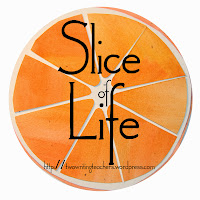There was much to love and think about in this session. Today's slice shares my thinking and my notes.
In the weeks after NCTE I often go back to notes to write and reflect, collecting ideas or noticing for class on the left page next to the notes I took during the session. Today I went back to my notes to gather ideas for a speaking mini-lesson. I loved that Harvey Daniels used Jerome Stern's Micro Fiction. I had Stern while at Florida State University and I remember well the short, short story contests. Our tenth grade team uses stories from this collection-- they are the perfect length when we want a quick assessment or dip into text, so Daniels use of them during session sure validated that practice.
 |
While I wondered during the session if Gallagher and Kittle often wound their way with students from conversation to digital projects (podcasts or videos for everyone), it was interesting to connect what they were saying to a conversation I'd had at breakfast. I too often land in the digital project zone with and sometimes I question where I am in terms of authentic, choice-driven tech integration. If I examine my practice in terms of the TIMs matrix, I'm not always working at the infusion or transformation levels. Sometimes we are, but we also spend time in the adoption and adaptation zones, especially when kids (or teachers) are learning together.
Digital spaces give students the ability to speak and be advocates in a space they do not have to inhabit. That is a real plus for students who do not have transportation. Digital spaces can minimize or even eliminate the need for transportation or a car pool--with a WiFi signal from school and supported work time--kids can get into the world with their voices.
Advocating in digital spaces is one reason why I love Project for Awesome. Set to launch this Friday, Project for Awesome has YouTube creators from around the globe creating content that features the amazing work done by charity organizations in an effort to raise awareness and money. To read more about the project started by Hank and John Green, dial the blog back to 2014.
Students have been writing, speaking and talking about their projects for a few days now. They have filmed and practiced. Today they put the pieces together to get the first draft recorded and on screen.
Tomorrow we will share with a sister class and students will give each other feedback. Students practiced speaking from their scripts today. We did "dramatic readings" using Sara Holbrook and Michael Salinger 's P.I.P.E.S. ideas (projection, inflection, pacing, expression and stance) today. One group was working in iMovie to create a trailer advocating for Southeastern Guide Dogs. Ana and Stephanie called me over to their table to show me their progress. I'd read their script and overheard some of their practice and conversation, so I was tickled to see how they planned to use the template for a trailer in iMovie. I saw a customized credits screen and a series of shots they'd planned. Ana spotlighted the actions the dogs would take when they filmed them after school. She wiggled. She squirmed in her seat. She smiled wide and brought her shoulders up with the corners of her moth saying, "I'm SO excited!" I can't wait to see what they create.
It's time to cue the music. When kids engage in learning we don't need a "Galvanic bracelet" to measure the moisture on their skin or the micronic width of their pores. When kids engage in learning, in speaking and in listening to each other and for others, we can hear in their voices. We can see it in how they can hardly contain themselves. The work of Daniels, Gallagher and Kittle remind us that we have to be relentless in our classrooms. We must remember that when one [teacher], one man, one woman comes into the classroom in the name of love, worlds change.
References from the session notes:
Adiche, Chimamanda Ngozi, "The Danger of a Single Story." TED, July 2009.
Lowell Milken Center for Unsung Heroes. Unsung Heroes Project, 2016.
Palmer, Erik. Well Spoken: Teaching Speaking to All Students. Portland, ME: Stenhouse, 2010.
Strauss, Valerie. "$1.1 million-plus Gates grants: ‘Galvanic’ bracelets that measure student engagement." The Washington Post, 11 June 2012.
Turkle, Sherry. Reclaiming Conversation: The Power of Talk in a Digital Age. NY, NY: Penguin, 2015.
Wodtke, Christina. "The Shape of Story." ElegantHack, 6 June 2015.
 |
| Thank you to Stacey, Betsy, Dana, Tara, Beth, Anna, Kathleen & Deb for creating community and valuing voice. Join us at Two Writing Teachers. Slide by the Slice of Life buffet for seconds or link up to serve your own slice of life. |
























